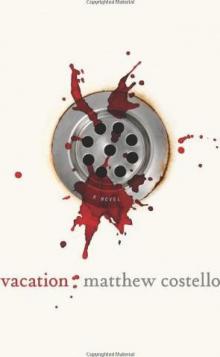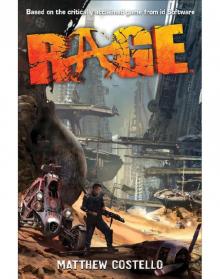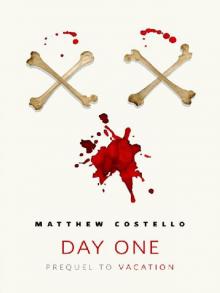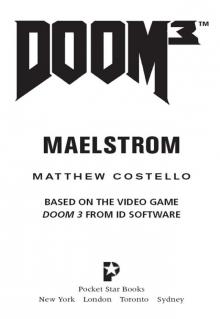- Home
- Matthew Costello
Beneath Still Waters Page 19
Beneath Still Waters Read online
Page 19
stores to be left.
Dan took a sip of his drink.
Nothing much exciting here, he thought. There was a
funny story of a cow that ate some dynamite, and then later
a story about how two workers died when the concrete base
was being poured.
(And where were they now? he wondered. Part of the
cement bedrock of the dam?)
He finished the first notebook, feeling that Billy
Leeper’s magnum opus might not have any great secret to
reveal.
b e n e a t h s t i l l w a t e r s
177
But that feeling all changed when he opened the second
notebook.
It contained jottings from Leeper—written in a scraggly
hand. There were comments in the margins and written
underneath the clippings.
Now all the material was taken from the years before
the dam was built. Pictures and stories from Gouldens
Falls in its salad days. There was a picture of the Lakeview
Hotel, a squat pillbox of a building with an elegant front
porch and stairs leading down to a dirt road. The church,
with its elegant steeple. A firehouse on a hill overlooking
the town. A photo of Main Street with its mixture of cars
and carriages. But Leeper had circled someone standing in
one of the pictures, right next to a roadster parked beside
the hotel.
There was a name scribbled in the margin. “Thomas
Raine,” Dan said, reading aloud.
Then he flipped to another yellowed page from the pa-
per. Jonathan Reynolds was announcing the annual Octo-
ber Harvest Festival. Behind him there was a stack of
pumpkins that stood over ten feet tall.
Mighty big pumpkins.
Who are these people? Dan wondered. Why had Leeper
tracked down their photos?
Then a doctor, holding twins. Dr. Samuel Hustis, beam-
ing as he cradled the twins, one in each arm. And a store-
keeper, personal photo here. A curling black-and-white
Kodak print of Mr. Wallace Pfister, who stood smiling be-
hind the counter of a store that looked like it sold every-
thing from sausages to sneakers.
He turned another page.
There was a space for another clipping, but it apparently
had come loose . . . slipped away.
“Probably in the box somewhere,” Dan said to himself.
He reached over and tipped in a few more fingers’ worth of
the Kentucky bourbon.
178
m a t t h e w j . c o s t e l l o
And underneath the space, scrawled twice as big as any
of the names, was a large question mark and a circle.
A question mark. Four names. Five photos. One ques-
tion mark.
He was thinking about this, as well as he could after a
couple of belts, when the phone rang. He shook, startled
by the brash ring.
It rang one more time and he picked it up.
F I F T E E N
She so hated being alone.
Even with the TV on in both the bedroom and living
room, Sharon Benny felt abandoned by her husband. Of
course, she never let Bob know that. She supported him
completely, doing her best to keep their modern, split-level
home running along smoothly. The last thing he needed
was her getting all fidgety about being by herself two or
three times a month.
To be sure, she trusted him totally. He just wasn’t the
type to use his jaunts for affairs. And he always came home
all worked up (“hot and bothered,” she called it), eager to
get the kids to sleep and spend time alone with her.
She guessed she was happy.
This seemed to be everything she wanted out of life. A
beautiful home overlooking the lake (even if they never
could get close to it), two reasonably well-behaved chil-
dren, no more obnoxious than the other kids she saw her
friends coping with. A devoted husband— something of a
rarity, to hear her friends talking. Still, sitting in the living 180
m a t t h e w j . c o s t e l l o
room, just cleaned today by Esther (another find!), she
couldn’t help feeling oddly dissatisfied.
Dissatisfied and disturbed.
She thought she’d like this house, all off to itself, sur-
rounded by heavy oak trees, well away from any neighbors.
But on a night like this, with Bob in California, she felt
a prisoner. The kids slept peacefully, but she tended to stay
up late—too late—tossing, turning, listening to the breeze
from the lake rustling the willow trees, an eerie whoosh.
More than once she was tempted to go to Dr. Rheinman
and ask for a sleeping-pill prescription ( just like her
mother, she thought, who progressed to regular doses of
Valium “for my nerves” until the medicine cabinet looked
a display at a pharmaceutical museum of horrors).
So she just roughed it out . . . like she would tonight.
She pushed the remote-control button and the picture
tube blinked off, leaving the filmy afterglow of a sandy-
blond newscaster.
She left the living room light on.
It’s worth the fifty cents or so of electricity, she thought.
She turned on the security system, first for the downstairs,
and, when she had reached the bedroom, for the upstairs.
It should have made her feel better—more protected.
But it didn’t.
“Slow down,” Dan said on the phone. Susan sounded ex-
cited, overwrought. He looked at his watch. It was nearly
eleven p.m. “Now, what happened?”
“Allan, my editor, called about an hour ago. The divers are
gone, Dan. gone! They were supposed to finish their search,
but they went down a second time and never came up.”
Dan looked at the notebook on his bed—open to the page
with the missing photo and the question mark. He thought
of the divers—Ed, a tight-lipped Clint Eastwood type who
b e n e a t h s t i l l w a t e r s
181
seemed totally unflappable; and Tom, who seemed to have
been developing a rocky set of nerves.
And now they were gone.
(What’s going on here?)
“What do the police know?” he asked.
“According to Allan, nothing. The guy in the boat . . .”
“Russo.”
“Yeah. Well, he stayed out there, going back and forth
for hours, calling for them on the radio. He had to be or-
dered to come in. Maybe they got hung up on something,
maybe one of the old buildings collapsed on them—”
Wrong. There was no way that two divers with their
experience could have let that happen.
“So what’s everyone doing?”
“The police aren’t saying anything, though Allan said
that the New York police were notified. State troopers are
already here. Another diving team might be on the way, but
it’s just speculation. I’ll know by tomorrow.”
“Oh . . . how will you know tomorrow?”
“Allan said I’m to can everything else and just stay on
this story—the dam, the missing people. It’s the biggest
story to h
it Ellerton since—”
Dan turned toward the door. He thought he heard some-
one walk by outside it. Footsteps on the poured concrete.
He could have sworn they paused a minute, and then
moved on.
Easy, boy, he thought. Wouldn’t do getting all paranoid.
“Susan, I don’t think that’s a good idea. You don’t know
what’s going on there. I—”
“C’mon, Dan. I’m a reporter, a writer like you. It’s a
story, a big one, too, and I’m not going to go diving.” She
paused, her irritation at his concern obvious. “I’m a big girl,
and there’s no reason why I shouldn’t cover this story.”
He tried to put his feelings into words, to find an argu-
ment to convince her to stay away.
182
m a t t h e w j . c o s t e l l o
“Don’t go there,” he said. “Just don’t go anywhere near
the dam and the reservoir.”
She was cool now, her voice turning flat and profes-
sional. “I have my job to do. I just called ’cause I thought
you’d be interested. I’m sorry you’re not. I have to get
some sleep. It’s going to be an early morning. Bye.”
Susan’s receiver clicked rudely in his ear.
So much for that blossoming relationship.
But as he went back to the open notebook, something
seemed to stick in his mind.
The picture of Claire walking into her house.
It’s almost as if she knew the bad news first . . . before
anyone.
He looked over at his diving gear, sprawled on the floor
around the squat dresser that he hadn’t used, preferring to
live out of his two suitcases.
The air tanks were all filled, ready for a nice dive into
the Kenicut Reservoir.
Except suddenly he wasn’t so eager to take that dive.
Sharon Benny had been asleep.
She was sure of it.
But then something woke her up.
She looked around her bedroom. The digital clock read
12:01. She listened. She heard her own breathing, irregu-
lar, as if she were taking random gasps of air. The pillow
rustled noisily in her ears as she turned her head from side
to side.
No sound now. It’s okay, she thought. I can go back to sleep.
( Try to go back to sleep.)
She curled around, hugging Bob’s pillow close, hating
him now for not being here. She closed her eyes tight, mak-
ing an iridescent pattern of crisscrossed lines appear before
her eyes.
b e n e a t h s t i l l w a t e r s
183
She heard something.
A sound from downstairs, down near the family room.
At first she knew, just knew, it couldn’t be anything
wrong. The security system was the best money could buy.
Any attempt at entering from the outside would trigger the
motion detectors.
Alarms all over, and a gaggle of rent-’em cops ready to
come to her home within minutes.
(She knew that because they had tried it out. “Just a mis-
take,” Bob had explained to them. But it really had been an
experiment. The system was worth its yearly maintenance
fee of two thousand dollars.)
She sat up a bit, again trying to listen. Mice, maybe? (If
she wasn’t so allergic to fur, they would have invested in a
cat a long time ago.)
No. It sounded like—
(Her heart started a strange tattoo. Gooseflesh—always
quick to rise on her—popped out.)
The sliding door being opened.
But why no alarm? Unless . . .
If it’s opened from the inside, it automatically neutral-
izes the alarm. (“Keeps your kids and pets from driving
you crazy,” the sleazoid salesman had explained.) She sat
up quickly, pausing just another second before making the
inevitable decision.
She got out of bed, ignoring her robe, and whirled into
Samantha’s room. Her daughter was asleep, curled up near
the top of her bed like she always was, her arm around her
Alf.
She started to feel a bit relieved. Samantha sometimes
got up, took a pee, and decided to dig around for some
goodies to eat in the middle of the night. Joshua, though,
was dead to the world until sunrise (at which point he al-
ways found some reason to wake everyone up).
She went into Joshua’s room.
For a moment she saw him there, wrapped up in his tangle
184
m a t t h e w j . c o s t e l l o
of sheets and blankets. But the room was dark, and she
looked more closely. He wasn’t there. She patted the sheet,
the blanket, the pillow, groaning as her hand felt only the
softness, and no little boy’s hard and bony body.
“Oh, God,” she said, and she ran out of the room, throw-
ing the hall light on, already creating explanations for
where he was.
He woke up . . . went and got a cookie . . . maybe tried
to find some cartoons on TV, sure, that’s all—except she
had heard the heavy door slide open.
She went down the stairs quickly and reached for the
light.
The family room was empty.
The red light—indicating that the security system was
on—was dark. Shut off.
And the sliding door was open to the moonlit night.
A pattern began to emerge.
But Dan hadn’t the foggiest clue as to what it had to do
with the reservoir.
There was one whole notebook filled with “human-
interest” newspaper clippings from Gouldens Falls. The
Johnson baby’s remarkable recovery from a horrible ill-
ness. Despite the drought of 1935, Mr. Patterson reported a
bumper crop of corn. (“We did some irrigating,” Patterson
was quoted as saying, a big smile on his face.) Donnelly’s
Hardware—most of its stock destroyed in a fire a month
earlier—reopened with a gala celebration, and an even
large selection of items. (“The insurance really helped,”
Joe Donnelly told reporters.)
Page after page, until it looked like Gouldens Falls had
become the garden spot of the world, a place where only
good things happened to nice, God-fearing people. The rest
of the country might have been in the middle of a hellish
b e n e a t h s t i l l w a t e r s
185
depression, but Gouldens Falls was prospering mighty
nicely, thank you.
He finished the notebook, seeing that the only thing
Leeper had written down was the names of the people in
the stories.
“Like some sort of scorecard,” Dan said aloud. He be-
gan to think that Leeper had done more than just bang his
head on that rock that day.
He started the next notebook.
It began in 1936, and now all of a sudden there were
different stories . . . tragic stories. Patterson’s prizewin-
ning mare falls down dead—a heart attack, the vet said.
And a toddler—little Annie Martin—falls victim to a par-
ticular nasty strain of the flu. The parents move away. A
house burns down. A young man has a stro
ke, falling into a
coma.
Again, there was a list of names in Leeper’s hand. And
Dan sensed what should have been obvious. Some of the
names are the same. It was as if they’d had a stroke of
some incredibly good luck, and then, later, something went
wrong. Not to all of them. But according to Leeper’s rec-
ords, many of the names were the same.
He poured himself a drink.
He rubbed his eyes. Eight notebooks left, and who the
hell knew what kind of story was coming out. He was
tempted to look at the last one.
He reached over and fingered its shiny metal spine.
He heard a car outside. No, he thought, listening, not a
car . . . a deeper rumble from its engine. From a pickup, or
maybe a small truck.
It entered the lot slowly, and Dan heard it pause by his
room, as if someone were checking out the numbers. Prob-
ably some guy four sheets to the wind trying to make the
room numbers stop going double on him.
I know that feeling, Dan thought.
186
m a t t h e w j . c o s t e l l o
He picked up the next notebook. And he thought it was
a mistake. More clippings, of course, with the dates circled
and the locations written in by Leeper. But they were from
all over.
Missing people. From nearby New York City. From
upstate. From Boston, Philadelphia.
There were copies of announcements—brown and hope-
less with age, all faded—asking if anyone “knew the where-
abouts of,” and then a name. Dozens of them. From 1936,
1937, and 1938. Why were they in this book? As if Leeper
had tracked down every missing person from those years.
Every unsolved missing person.
He stood up, letting the notebook slide to the bed. He
shook his head. What is this? What’s going on here? And
maybe it’s time I got out of it.
He looked at his AMF diving suit—not the most mod-
ern, easily out-of-date by a good five years—hanging in
the closet. His knife, a mean, jagged-edged item that he
kept razor-sharp, was draped over the coatrack.
He thought of Tom and Ed.
(Supposedly it’s not so bad dying by drowning. The air
gives out, and you start sucking your own carbon monox-
ide back in. Your head starts to spin. You black out. Not so
bad. Supposedly.)
If that’s what had happened to them . . . if somehow
they’d been pinned under the water.
(But Dan remembered being trapped in his car, feeling
the icy water shooting in, sitting there watching it fill the

 Cherringham--Too Many Lies
Cherringham--Too Many Lies Mydworth Mysteries - A Shot in the Dark (A Cosy Historical Mystery Series Book 1)
Mydworth Mysteries - A Shot in the Dark (A Cosy Historical Mystery Series Book 1) Cherringham--The Gentleman Vanishes
Cherringham--The Gentleman Vanishes Cherringham--Cliffhanger
Cherringham--Cliffhanger Beneath Still Waters
Beneath Still Waters Cherringham--Trail of Lies
Cherringham--Trail of Lies The Gentleman Vanishes
The Gentleman Vanishes Mydworth Mysteries--Murder wore a Mask
Mydworth Mysteries--Murder wore a Mask Mydworth Mysteries--London Calling!
Mydworth Mysteries--London Calling! Cherringham--Killing Time
Cherringham--Killing Time Mydworth Mysteries--The Wrong Man
Mydworth Mysteries--The Wrong Man Cherringham - The Drowned Man
Cherringham - The Drowned Man Cherringham--Killer Track
Cherringham--Killer Track Cherringham--The Secret of Brimley Manor
Cherringham--The Secret of Brimley Manor A Deadly Confession
A Deadly Confession Cherringham--Murder under the Sun
Cherringham--Murder under the Sun Cherringham - A Dinner to Die For
Cherringham - A Dinner to Die For Family
Family Cherringham--Death Trap
Cherringham--Death Trap Cherringham--The Curse of Mabb's Farm
Cherringham--The Curse of Mabb's Farm Vacation
Vacation Cherringham--A Bad Lie
Cherringham--A Bad Lie Doom 3™: Worlds on Fire
Doom 3™: Worlds on Fire Cherringham--Scared to Death
Cherringham--Scared to Death Home
Home Dead in the Water
Dead in the Water Star Road
Star Road Rage
Rage Cherringham--A Fatal Fall
Cherringham--A Fatal Fall Jack Murphy_Prequel_Day One
Jack Murphy_Prequel_Day One Doom 3™: Maelstrom
Doom 3™: Maelstrom